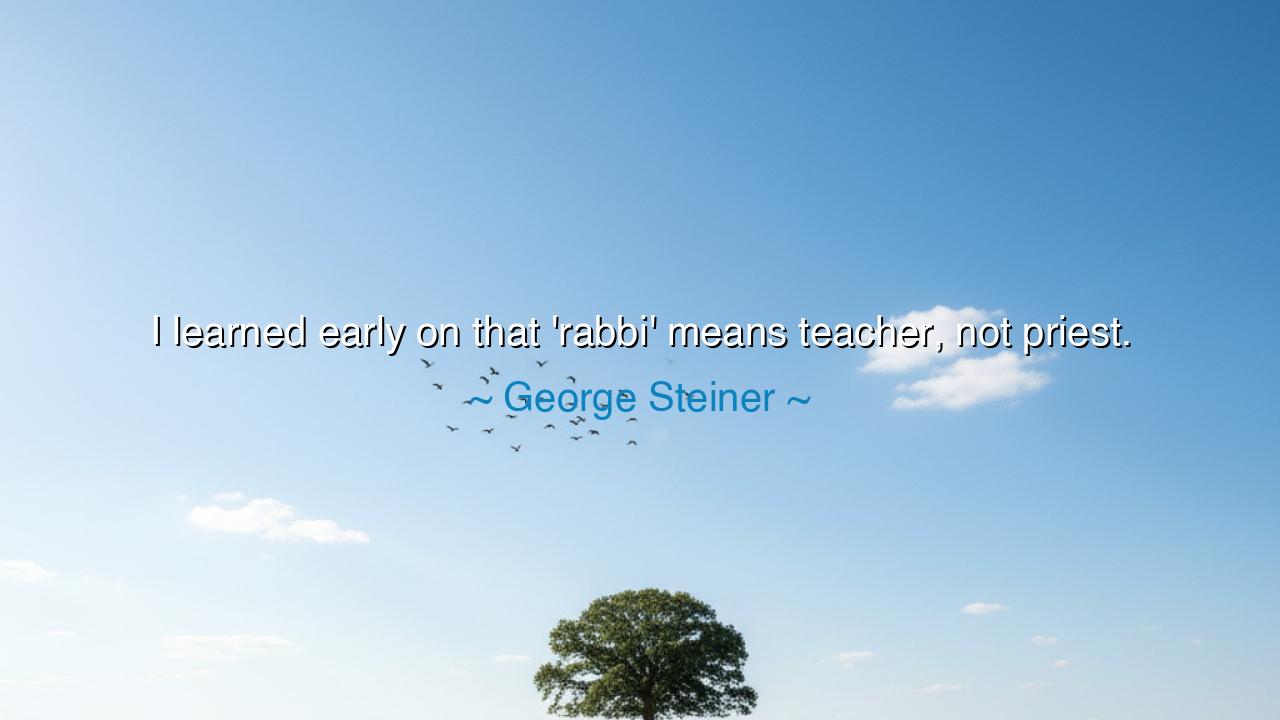
I learned early on that 'rabbi' means teacher, not priest.






Hearken, O seekers of wisdom and disciples of learning, to the words of George Steiner, who declares: “I learned early on that 'rabbi' means teacher, not priest.” In this simple yet profound observation lies a meditation on the nature of authority, the purpose of guidance, and the sacred role of instruction. The ancients recognized that the highest calling is not ritual or ceremony alone, but the imparting of knowledge, insight, and moral understanding, the shaping of minds and hearts through the enduring power of teaching.
Steiner’s reflection illuminates the distinction between ceremony and mentorship. A priest, though revered, often mediates the divine through ritual and tradition, guiding the soul toward sacred observance. A teacher, by contrast, engages directly with the intellect and spirit, cultivating reason, understanding, and moral discernment. The rabbi, in Steiner’s observation, is an exemplar of this path: a guide whose power lies not in authority over rites, but in the capacity to awaken thought and reflection in those who listen.
The recognition that a rabbi is a teacher speaks to a broader truth: education is both moral and intellectual, and those who shape minds wield profound influence. The ancients understood this principle; the philosopher in the agora, the mentor in the gardens, the scribe instructing disciples—all held sway not through ceremonial authority, but through the transmission of insight, rigor, and wisdom. Steiner’s epiphany is thus timeless: the vocation of teaching is sacred, enduring, and transformative.
Consider the practical implications of this distinction. To teach is to cultivate critical thinking, moral discernment, and personal responsibility, while ceremonial authority may inspire awe but does not alone illuminate understanding. Steiner’s insight challenges us to value those who guide thought and character, who engage directly with the mind, and who cultivate reflection, curiosity, and conscience in their pupils. The teacher is the artisan of the soul, shaping the clay of intellect and spirit with care and skill.
Historical exemplars illuminate this truth. Hillel the Elder, the renowned rabbi of ancient Judea, taught not merely the observance of ritual, but the ethical and spiritual application of the Law. His disciples learned humility, reasoning, and compassion, and his influence endures across millennia. Like Steiner, those who recognize the rabbi as a teacher perceive the profound distinction: instruction cultivates wisdom that ritual alone cannot confer.
O listener, perceive the lesson here: to seek guidance is to seek teaching, not merely ceremonial authority. The true measure of a mentor lies in their ability to illuminate, challenge, and cultivate understanding. The words of the rabbi, the philosopher, and the master teacher resonate because they transform the listener, nurturing insight, discernment, and moral awareness that endure long beyond the classroom or pulpit.
Practical guidance flows naturally from this reflection. Seek mentors who are teachers at heart, those who cultivate thought, curiosity, and moral integrity. Honor those who instruct with clarity, patience, and insight, and recognize the distinction between formal authority and genuine guidance. In your own life, aspire to embody the role of the teacher, imparting wisdom, nurturing reflection, and shaping understanding in those who seek your counsel.
Thus, O seeker, engrave this wisdom upon your spirit: the rabbi, the guide, and the teacher wield enduring power not through ceremony, but through the cultivation of mind and heart. George Steiner’s insight reminds us that the highest calling is to teach, illuminate, and inspire, shaping lives with knowledge, reflection, and moral vision. In honoring this path, one participates in the timeless work of civilization itself, passing the torch of understanding from generation to generation.






AAdministratorAdministrator
Welcome, honored guests. Please leave a comment, we will respond soon